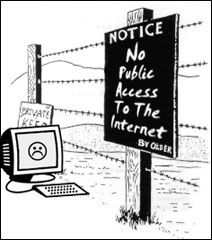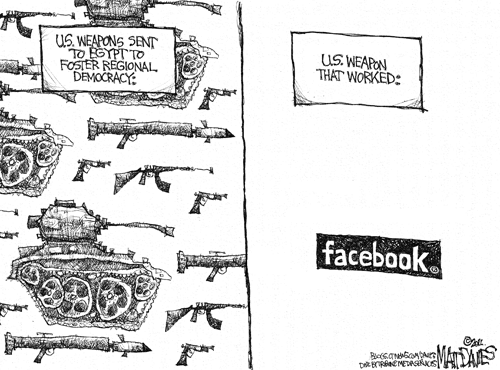It’s not a secret: the Internet was always going to radically change the world of information. That’s nothing new. What is new, is that the struggle over who controls and possesses information isn’t going to be fought solely in the courts or in the legislatures or the media. It’s going to be fought out as well on the Internet itself and the weapons are going to be computers.
The present battle, fought between Wikileaks and its allies, on one side, and its well organized adversaries, including financial organizations and governments, on the other, may eventually bring information democracy, in the form of unprecedented and simple access to all kinds of information, even classified or secret information, to anyone with a modem. Or at the other pole, it may eventually bring unprecedented censorship through even tighter control of information to the Internet and harsh penalties for publication of various kinds of information.
The New York Times reports from today’s digital battlefront:
LONDON – A broad campaign of cyberattacks appeared to be under way on Wednesday in support of the beleaguered antisecrecy organization WikiLeaks, which has drawn governmental criticism from around the globe for its release of classified American documents and whose founder, Julian Assange, is being held in Britain on accusations of rape.
Attacks were reported on Mastercard.com, which stopped processing donations for WikiLeaks; on the lawyer representing the two Swedish women who have accused Mr. Assange of sexual improprieties; and on PostFinance, the Swiss postal system’s financial arm, which closed Mr. Assange’s account after saying he provided false information by saying that he resided in Switzerland.
At least some of the attacks involved distributed denials of service, in which a site is bombarded by requests from a network of computers until it reaches capacity and, effectively, shuts down.
It was unclear whether the various attacks were independently mounted, but suspicion was immediately focused on Anonymous, a leaderless group of activist hackers that had vowed to wreak revenge on any organization that lined up against WikiLeaks and that claimed responsibility for the Mastercard attack.
Anonymous, according to the Times, has expressed its philosophy in two manifestos released this past week, and is battling for nothing less than free information on a free Internet:
The group, which gained notoriety for their cyberattacks… released two manifestos over the weekend vowing revenge against enemies of WikiLeaks.
“We fight for the same reasons,” said one. “We want transparency and we counter censorship.”
The manifestos singled out companies like PayPal and Amazon, who had cut off service to WikiLeaks after the organization’s recent release of classified diplomatic documents from a cache of 250,000 it had obtained.
In recent days, Gregg Housh, an activist who has worked on previous Anonymous campaigns, said that a core of 100 or so devout members of the group, supplemented by one or two extremely expert hackers, were likely to do most of the damage. Mr. Housh, who disavows any illegal activity himself, said the reason Anonymous had declared its campaign was amazingly simple. Anonymous believes that “information should be free, and the Internet should be free,” he said,
Information, as the law now stands, is anything but free. But the Internet for more than a decade and a half has eroded much of the traditional deference to ownership of information. Napster and its progeny have brought a generation of people who think music and film should all be free. Readers of Blogs are never disturbed by what amounts to wholesale infringement of copyrighted photos and videos and text. Wikileaks has carried this a step further by publishing enormous amounts of material officially designated “secret”. The trend on the Internet is toward free and unfettered access to all information. But those who own the information have no intention whatsoever to allow it to flow without charge and without a fight.
Today’s attacks, I think, mark the Cyber Battle of Lexington and Concord.
——-
simulposted at The Dream Antilles

 In the November elections, one of the greatest losses that the left suffered was Russ Feingold. What we didn’t notice until this past week during the rush to please the right wing and President Obama by renewing the unaltered (un)Patriot Act for four more years was that there were others who had picked up the cause of the left, Sen. Ron Wyden (D-OR), Mark Udall (D-CO), Jeff Merkley (D-OR) and Tom Udall (D-NM).
In the November elections, one of the greatest losses that the left suffered was Russ Feingold. What we didn’t notice until this past week during the rush to please the right wing and President Obama by renewing the unaltered (un)Patriot Act for four more years was that there were others who had picked up the cause of the left, Sen. Ron Wyden (D-OR), Mark Udall (D-CO), Jeff Merkley (D-OR) and Tom Udall (D-NM). Sen. Al Franken, (D-MI) has called Internet Freedom
Sen. Al Franken, (D-MI) has called Internet Freedom 